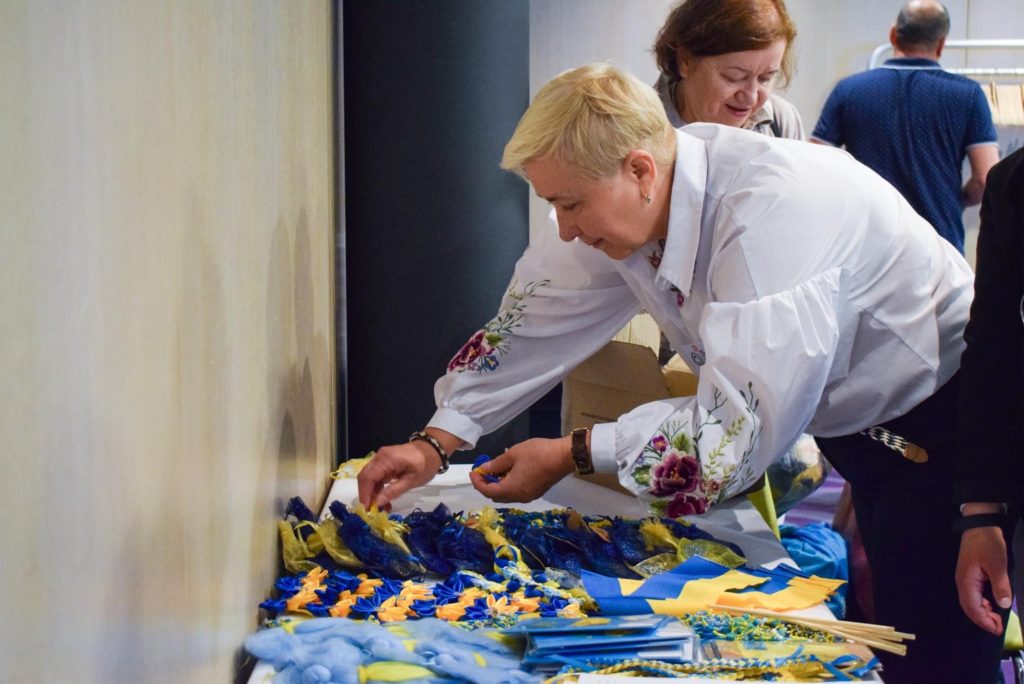Olena Kravchenko and Raisa Kravchenko spoke at Europe in Action to End Segregation conference in Brussels.
- Olena is chair of the board of the VGO Coalition, our member in Ukraine. Her speech is below.
- Raisa represents the VGO Coalition; she is also chair of the Djerela NGO in Kyiv. You can read her speech here.
- Olena and Raisa share a surname, but they are not related.
We are very grateful for all the people here who helped and supported our delegation from Ukraine.
I am the chairman of the council of all Ukrainian organisations that brings together 118 NGOs of people with intellectual disabilities. That represents about 14 thousand families and people with intellectual disabilities. We became a member of Inclusion Europe, and that is why we are here today.
Ukraine has achieved a lot of progress, and services were working for children and adults with disabilities. At the same time, there is a big problem with institutionalisation of people with disabilities in Ukraine.
We also have an organisation in Mariupol, called “Believe in yourself”. Using this organisation as an example, I would like to tell you about services in Ukraine.
My organisation consists of 210 families with a person with psychosocial or intellectual disability. 80 families out of those 210 have children with disabilities, the others are adults with disabilities.
Our organisation provided services for day-care for people with disabilities. These services were free for the people, financed by the state, municipalities, and charity donors.
But 24 February changed everything. We could make connection only with 45 out of the 210 families. Those families are the ones who left Mariupol and went somewhere else in Ukraine or another country.
In occupied territory, people don’t have enough food, medicine, suitable conditions
As for myself, we lived in a basement for 25 days, before I managed to get out of there. We were without food, gas, electricity.
I have deep, painful feelings with the families who have stayed in Mariupol in occupied territory. People who are now in Mariupol don’t have enough food, appropriate medicine, suitable conditions of life.
Unfortunately, 4 people with disabilities in our organisation died. A lot of people were brought abroad to the Russian territory, and some were brought to psychiatric hospitals. Such situation is not only in Mariupol, but also in other occupied territories.
Buildings which we used for our services have been destroyed completely. 90% of the buildings in Mariupol were fully destroyed, and we know there is nowhere we could return.
It is important in other cities services can continue
Fortunately, Ukraine is a big country with many cities, and we are glad the VGO Coalition continues to work in other cities. These organisations continue services for people with intellectual and psychosocial disabilities.
We understand very well that the war changed the priorities of the government funding. We wouldn’t be able to provide services now without your help. We are very grateful that you could support us from the first days. We appreciate this a lot.

We thank every person and every family who can support us, every little thing matters and we are very grateful to you. Our families and their children with disabilities made beautiful Ukrainian souvenirs with their own hands to thank you. We ask you to take these Ukrainian souvenirs, to take our hearts with you. Thank you for all the things you did for us.
VGO Coalition video about support they received
More information
- Do not use Ukraine recovery money for institutions, but for support to independent living – Raisa Kravchenko
- How the money collected for Ukraine helps people with intellectual disabilities and their families.
- CRPD Committee: Report on Ukraine + submissions by Inclusion Europe and VGO Coalition
- If you are being overlooked in normal times, it is unlikely that anyone will take you into account during a crisis
- 100 days: Ukrainians with intellectual disabilities and their families surviving the war
- “NGOs are at the forefront providing support to refugees with disabilities,” organisations in Moldova, Poland, Romania, Czechia tell us
- One month of the Russian war on Ukraine in the words of families of people with intellectual disabilities





